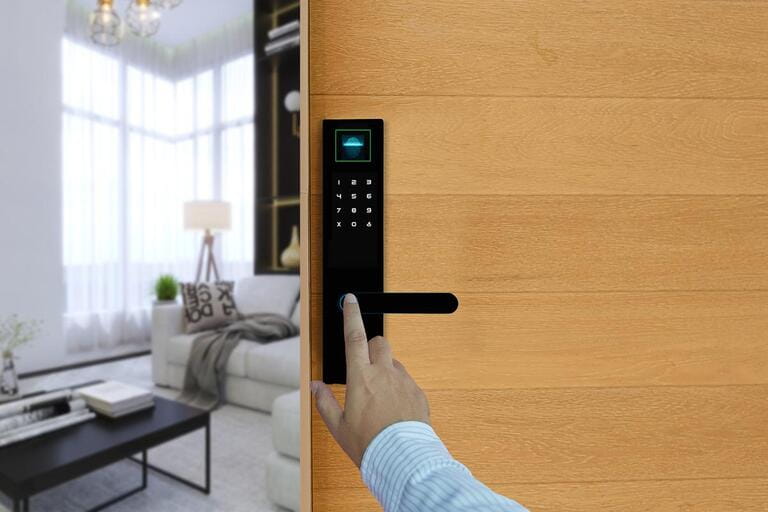In an age where technology is revolutionizing every aspect of our lives, the way we secure our homes and spaces has also taken a leap into the future. One such innovation that has captured the imagination is the fingerprint door lock – a sophisticated security solution that promises convenience and cutting-edge protection. But amidst the awe and wonder, the question lingers: Is a fingerprint door lock safe? As your friendly neighborhood expert, I'm here to guide you through the ins and outs of this fascinating technology, dispel myths, and uncover the layers of security that lie beneath your very fingertips.
Is Fingerprint Door Lock Safe
1. Understanding Fingerprint Door Locks
Before we dive into the safety aspect, let's understand what a fingerprint door lock is and how it operates. Fingerprint door locks, also known as biometric locks, use your unique fingerprint pattern to grant access. The lock stores your fingerprint data in an encrypted format and compares it with the scanned fingerprint during authentication. If there's a match, the door unlocks, granting you entry.
The technology behind fingerprint door locks is rooted in biometrics – the science of identifying individuals based on their physical and behavioral traits. In this case, the unique pattern of ridges and valleys on your fingertip serves as the key to unlock the door. Unlike traditional keys or access codes, your fingerprint is something you always have with you, making it a convenient and seemingly foolproof method of access control.

2. The Safety of Biometric Authentication
Biometric authentication, such as fingerprint scanning, is considered one of the most secure methods of access control. Here's why:
Unique Identity: Your fingerprint is like a digital signature – it's unique to you and you alone. Unlike keys or access codes, which can be lost, stolen, or shared, your fingerprint is a personal identifier that can't be replicated. Even identical twins have distinct fingerprints.
Difficult to Spoof: Modern fingerprint scanners are designed to detect living tissue, making it incredibly difficult to fool the system with artificial fingerprints. Attempts to use a replica or a photograph of a fingerprint are typically unsuccessful.
Encrypted Data: Fingerprint data stored in the system is encrypted, adding an extra layer of security. Even if a breach were to occur, the stolen data would be virtually unusable without the corresponding decryption keys. This makes it exceptionally challenging for unauthorized parties to make sense of the captured fingerprint information.

3. Addressing Concerns
While the security of fingerprint door locks is impressive, it's natural to have some concerns. Let's address some of the common worries and provide insights:
Data Privacy: Many fear that their fingerprint data might be misused or stolen. Reputable manufacturers employ strong encryption methods to safeguard your data. Additionally, fingerprint data is typically stored locally on the device itself, reducing the risk of data leaks or hacking attempts targeting centralized databases.
False Positives and Negatives: While extremely rare, false positives (an unauthorized person gaining access) and false negatives (an authorized person denied access) can occur. Manufacturers continually refine their algorithms to minimize such occurrences and ensure the utmost accuracy.
Power Outages and Failures: What if the power goes out, or the fingerprint scanner malfunctions? Biometric locks often come with backup options, such as traditional keys or keypad access, to ensure you're never locked out in case of power outages or technical glitches.
4. Factors Influencing Security
The overall security of a fingerprint door lock can vary based on several factors:
Quality of the Device: High-quality fingerprint door locks from reputable manufacturers tend to have better security features and encryption protocols. When considering a fingerprint door lock, opt for trusted brands with a track record of producing reliable and secure products.
Installation and Maintenance: Proper installation and regular maintenance are essential for maintaining the security of any lock, including fingerprint door locks. Ensuring the lock is correctly installed and periodically checking for updates or maintenance needs can enhance its longevity and effectiveness.
Additional Features: Some fingerprint door locks come with additional security features that further bolster their safety. These may include multi-factor authentication (requiring both a fingerprint and a PIN), remote monitoring capabilities, and integration with broader home security systems.

5. Enhancing Security Practices
While fingerprint door locks offer robust security, it's important to complement their use with good security practices:
Keep Your Fingers Clean: Clean and dry fingers ensure accurate readings by the fingerprint scanner. A smudged or wet finger might result in an unsuccessful authentication attempt.
Regularly Update Firmware: Just like any digital device, keeping the lock's firmware up to date is crucial. Manufacturers often release firmware updates that address security vulnerabilities or enhance the lock's performance.
Backup Options: While fingerprint authentication is reliable, it's wise to familiarize yourself with backup methods, such as traditional keys or PIN codes. In the rare event of a technical glitch or if a fingerprint isn't recognized, you'll still have a reliable way to access your space.
Conclusion
So, back to our initial question: Is a fingerprint door lock safe? The resounding answer is yes. Fingerprint door locks offer a high level of security by leveraging the unique and unchangeable nature of your fingerprints. With their robust encryption, resistance to spoofing, and advanced technology, they provide a strong deterrent against unauthorized access. While no security solution is completely impervious, the layers of protection provided by fingerprint door locks are a formidable defense.
By understanding the technology behind fingerprint authentication, addressing common concerns, and implementing good security practices, you can confidently embrace the future of home security. With a fingerprint door lock in place, you're not only stepping into a world of convenience but also tapping into a realm of cutting-edge protection that rests comfortably beneath your very fingertips. So, bid farewell to traditional keys and codes, and welcome the future of secure access with open arms – or rather, open palms!











